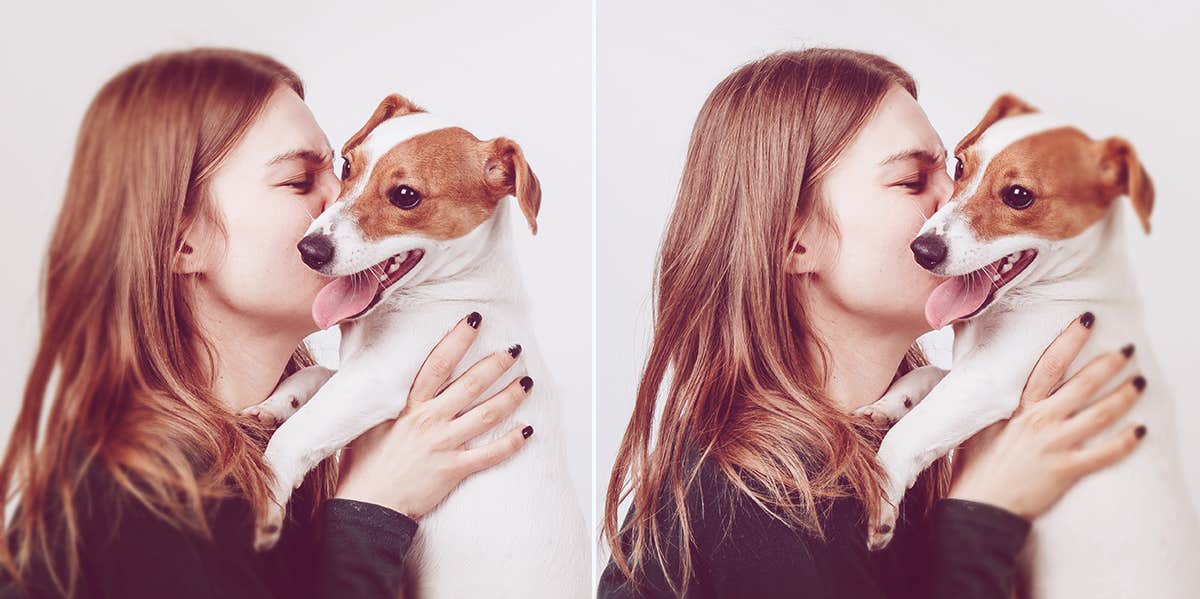How Your Dog Really Feels About You, According To Science
Do dogs truly love us unconditionally?
 Ochinnikova / Shutterstock
Ochinnikova / Shutterstock Dogs do so much for us: they protect us, transport us, guide us, and love us.
And all they ask from us is food, shelter, exercise, and affection — oh, and sometimes they ask us for our patience when they won't stop barking or when they find an especially intriguing scent on a bush during a walk.
Dogs enrich our lives and make us happy just by wagging their tail and knocking us down with their enthusiasm.
"Thank you for coming home today," they seem to say. It takes so little effort to bring a dog joy that it makes almost every other relationship in our lives seem like endless work.
Dogs are just as important to many people, as people are.
The Huffington Post partnered up with Purina and Purina Better With Pets Summit to look into finding answers about dogs and their feelings, especially their feelings where humans are concerned.
This is how your dog really feels about you, according to science:
1. They anticipate punishment after doing something bad
You know the moment you step into your house that your dog has done something he's not supposed to, and then you find the trash can in the kitchen, overturned with its contents splayed all over the floor. Your dog is hanging his head down in what you assume is guilt, as he knows he's not supposed to get into the garbage.
According to the book Decoding Your Dog from the American College of Veterinary Behaviorists, your dog doesn't feel guilty, but he's learned to anticipate you yelling at him. Your dog can tell you're upset and quite possibly angry, so they use their body posture to communicate that you should calm down.
They also use the averted look, droopy ears, and downward-facing-dog pose to avoid punishment.
2. They get jealous
If you have more than one dog, you've seen it happen: you're giving attention to one dog, and another one comes up and licks your hand or tries to get on your lap. According to a study published in PLOS ONE, dogs do get jealous.
Researchers say, "We found that dogs exhibited significantly more jealous behaviors (e.g. snapping, getting between the owner and object, pushing/touching the object/owner) when their owners displayed affectionate behaviors toward what appeared to be another dog, as compared to nonsocial objects." Green looks good on you, Duke.
3. They can pick up on human emotions
Dogs are naturally skilled at something called social eavesdropping, or the use of information collected by observing interactions between others. In one study, Italian scientists invited 100 dog owners and their pets to participate. In the experiment, the dogs watched as their owners requested help and were either rudely ignored or got the help they asked for.
The overwhelming majority of the dogs whose owners didn't receive help ignored food offered to them by the person who had disregarded their owner. Your dog is definitely on your team. Dogs are also good at reading human emotions in that they pick up on subtle changes in the tone of your voice, and they can also read the expressions on your faces, according to a study in "Current Biology."
4. They probably can't recognize your face over video chat
When you're away from your dog and miss them so much you could burst, setting up a video chat with them (via your dogsitter) can help you feel much better, but does your dog even know it's you? The answer is a definitive maybe.
Dogs recognize people from their scents, and smell-o-vision hasn't been invented for either FaceTiime or Skype, so your dog would have to rely on facial and vocal recognition to know it's you. A study found that there's a specific part of a dog's brain that processes faces and it's active when dogs see pictures of people. But it hasn't been proven one way or another if dogs can recognize their human by face alone.
5. They love unconditionally
When people come in close contact with their loved ones, they experience an increase in oxytocin (the love hormone), which plays a significant role in bonding.
A study by Azabu University's School of Veterinary Medicine in Sagmihara, Japan found that dogs love to be with us as much as we love to be with them, and they feel the same kind of love bonding that we do. Some dogs crave affection, contact, attention, pats, chin scratches, and cuddling over almost anything — even food and throwing the ball.
Dogs are there when you need them and will never let you down, as long as you're good to them in return. If you don't have a pet, what are you waiting for? You won't regret adopting one today.
Christine Schoenwald is a writer and performer. She's had articles in The Los Angeles Times, Salon, Bustle, Medium, and Woman's Day.
